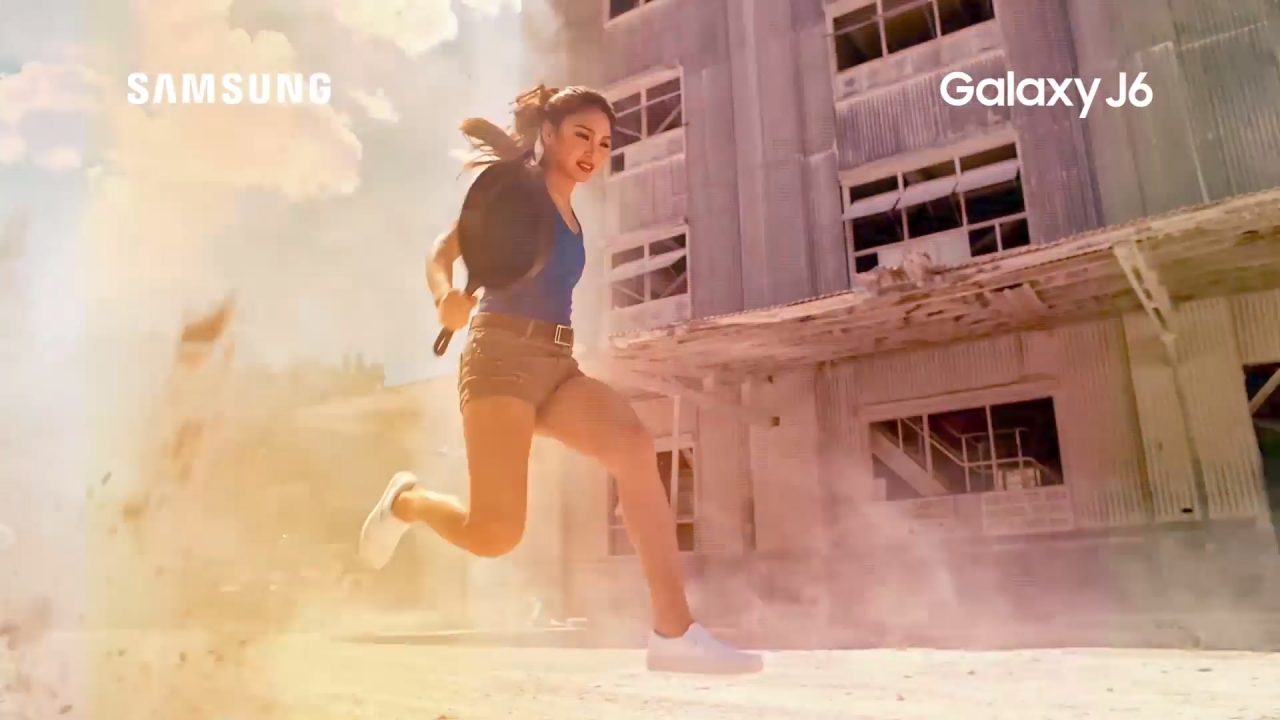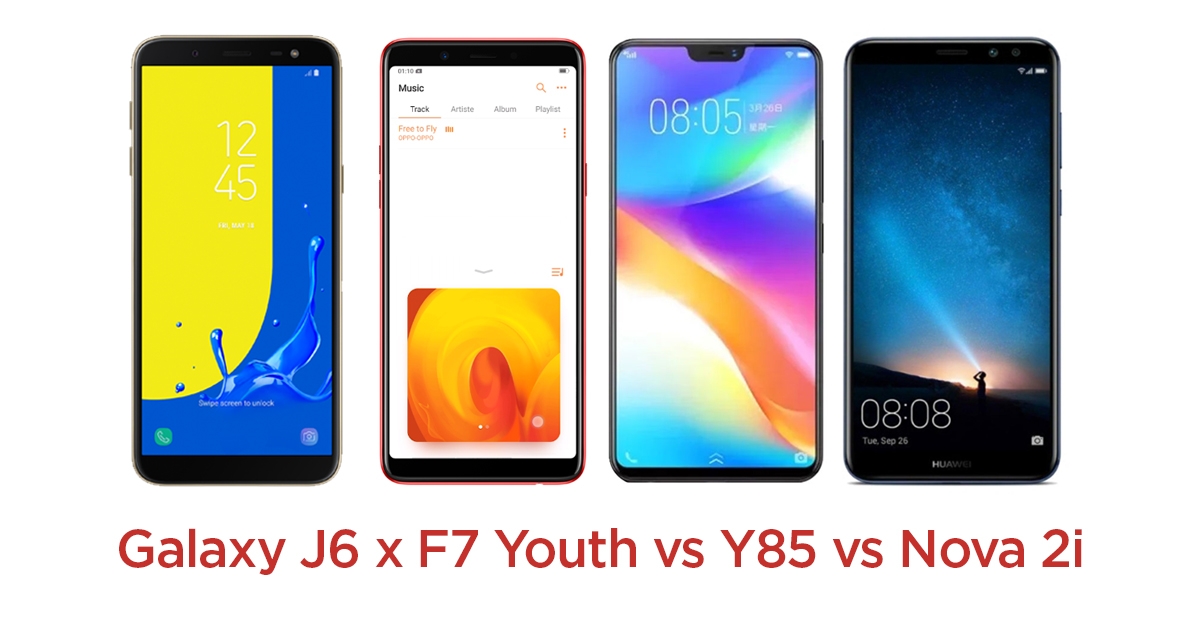
As the Php10,000-Php15,000 price range smartphones are now refreshing, the Korean Giant Samsung just recently announced the arrival of its latest mid-range Galaxy J6. Complete with a new ambassador, Nadine Lustre which is previously from Motorola.

The main selling proposition of Samsung in this price range is its Super AMOLED Display in Infinity display mode. This is a 5.6″ Display in an 18:9 ration that maximized the body of the phone in a smaller footprint, thus we suspect the body size of this phone is like a 5.2″ smartphone.
Aside from this, it looks like the J6’s internals are almost similar to last year’s Galaxy J7 Pro. Thus its Exynos 7870 processor is already considered as dated with even a lower ram of 3GB and 32GB of storage.

| Samsung Galaxy J6 | OPPO F7 Youth | Vivo Y85 | Huawei Nova 2i | |
| Display | 5.6″ 18:9 Aspect Ratio | 6.0 18:9 Full Screen | 6.23″ 18:9 Full Screen | 5.9″ 18:9 Full Screen |
| Display Resolution | 1480×720 | 2160×1080 | 2280×160 | 2160×1080 |
| Display Type | SuperAMOLED | LTPS IPS | IPS | IPS |
| Front Camera | 8MP f/1.9 with LED | 8MP f/2.2 with AI | 8MP f/2.2 with AI | 13MP f/2.0 + 2MP |
| Rear Camera | 13MP f/1.9 with LED | 13MP f/2.2 with LED Flash with AI | 13MP + 2MP f/2.2 with LED Flash | 16MP f/2.2 + 2MP |
| Processor | Exynos 7870 Octa 1.6 GHz Cortex-A53 | Helio P60 2.0GHz (4×2.0 GHz Cortex-A73 & 4×2.0 GHz Cortex-A53) | Helio P22 2.0 GHz Cortex-A53 | Kirin 659 (4×2.36 GHz Cortex-A53 & 4×1.7 GHz Cortex-A53) |
| Graphics | Mali-T830 MP1 | Mali-G72 MP3 | PowerVR GE8320 | Mali-T830 MP2 |
| AI CPU | No | Yes | No | No |
| RAM | 3GB | 4GB | 4GB | 4GB |
| Storage | 32GB | 64GB | 32GB | 64GB |
| Fingerprint | Yes | No | Yes | Yes |
| Face Unlock | Yes | Yes | Yes | Yes (Update) |
| OS | Android 8.0 Oreo | Android 8.1 Oreo | Android 8.1 Oreo | Android 7.0 with Update to Oreo |
| Battery | 3000mAh | 3410mAh | 3260mAh | 3340mAh |
| Body Type | Matte Plastic | Glossy Plastic | Matte Plastic | Metal |
| Weight | 154g | 155g | 150g | 164g |
| Price | 13,990 | 13,990 | 13,999 | 12,990 |
As compared to the OPPO F7 Youth, Vivo Y85 and even last year’s Huawei Nova 2i, the Galaxy J6 barely rises above the rest of its similarly priced competitors. Here is the breakdown of each area you should focus.
For this one is very subjective, for the size you should go for Vivo if you would like the biggest while Samsung for the smallest. But more than size, Samsung will be the most colorful and immersive as its posses the SuperAMOLED display. This is great for people who primarily use their smartphone as their primary screen, but once you transfer to another device, even uploaded photos will be the same as others.
IPS screen, on the other hand, is natural and more friendly to the eyes. So it will be a preference of what screen you will need, just remember that it might be clear on the phone but once uploaded…its another story.
Resolution wise the J6 and Y85 are both using HD+ resolution of 720p, whereas the Nova 2i and F7 Youth have FHD+ 1080p display. This will be a major factor to some and for us the more pixels will be better.
OPPO F7 Youth wins this category hands down, for all models with the similar price point, it’s only the F7 Youth that can go above 130k in AnTuTu Benchmark scores. While the Galaxy J6, Y85, and the Nova 2i can all average around 60-70k in AnTuTu. Thus making the F7 a clear choice in performance along with its dedicated AI processors and 4GB RAM.
The Galaxy J6 and Y85 both have 3GB RAM, while this isn’t bad, it’s not good either as competitors in its price range already are in the 4GB stage.
All units have dedicated microSD slots for usage, but the Galaxy J6 and Y85 lack in internal storage as they only provide 32GB. While you can argue that a MicroSD card can simply put it as a remedy, the speed transfer is simply not the same.
This part will be subjective, but for overall packaging, the J6 stands out in good form factor for the hand. While the F7 Youth’s Diamond Black back can bring attention to anyone. For the Y85 and Nova 2i, their designs can be generic or stand out depending on preference. For this one, its all for the customer’s taste.
Camera wise, the J6 stands out in having a better aperture for low light and photography. It also has a front LED flash for selfies and AR stickers like the rest of the competitors. But regardless of unit, all are capable of bokeh photography…though the Nova 2i is the only one that can edit afterward thanks to the dual camera system.
With all having face unlock technology, its safe to say that these smartphones have an extra layer of protection. Except for the OPPO F7 Youth with no fingerprint scanner, though remember that this phone triumphs in the performance division and we think this is the trade-off.
On paper, the F7 Youth have the biggest battery at 3410mAh, while competitors are closing down with the J6 last at 3,000mAh. In terms of battery efficiency, we can safely say that all smartphones can go further than 10 hours of continuous use but in here will test the best efficiency.
In our experience with the Nova 2i, it can go around 13 hours continuously while the F7 can go 15 hours safely. It will be a tough competition for the J6, but hopefully, the power saving SuperAMOLED is up for it.
While we haven’t experienced all phones, the J6 is definitely going to face a lot of battle today considering competitors have adapted to simply no longer say “Selfie”. Despite the Nova 2i now going more than 6 months old, it’s still a formidable choice for users at its tempting price.
For Php13,990, the Galaxy J6 is great for visual immersion but not future proofing your performance for the next generation of games. Perhaps after PUBG, the games will be more graphics intense and that’s where the Exynos 7870 processor will be defeated.
If we place it on a game perspective, the Galaxy J6 definitely has a frying pan to dodge itself from bullets but other competitors have their own frying pans as well.
